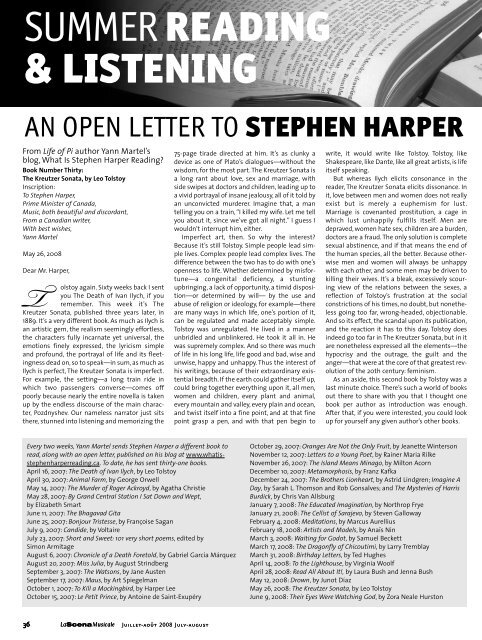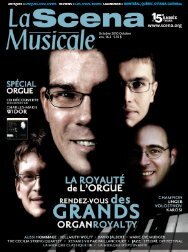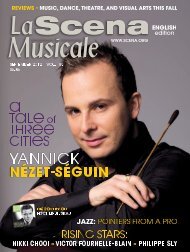Adobe Acrobat PDF complet (7 Meg) - La Scena Musicale
Adobe Acrobat PDF complet (7 Meg) - La Scena Musicale
Adobe Acrobat PDF complet (7 Meg) - La Scena Musicale
You also want an ePaper? Increase the reach of your titles
YUMPU automatically turns print PDFs into web optimized ePapers that Google loves.
SUMMER READING<br />
& LISTENING<br />
AN OPEN LETTER TO STEPHEN HARPER<br />
From Life of Pi author Yann Martel’s<br />
blog, What Is Stephen Harper Reading?<br />
Book Number Thirty:<br />
The Kreutzer Sonata, by Leo Tolstoy<br />
Inscription:<br />
To Stephen Harper,<br />
Prime Minister of Canada,<br />
Music, both beautiful and discordant,<br />
From a Canadian writer,<br />
With best wishes,<br />
Yann Martel<br />
May 26, 2008<br />
Dear Mr. Harper,<br />
T<br />
olstoy again. Sixty weeks back I sent<br />
you The Death of Ivan Ilych, if you<br />
remember. This week it’s The<br />
Kreutzer Sonata, published three years later, in<br />
1889. It’s a very different book. As much as Ilych is<br />
an artistic gem, the realism seemingly effortless,<br />
the characters fully incarnate yet universal, the<br />
emotions finely expressed, the lyricism simple<br />
and profound, the portrayal of life and its fleetingness<br />
dead on, so to speak—in sum, as much as<br />
Ilych is perfect, The Kreutzer Sonata is imperfect.<br />
For example, the setting—a long train ride in<br />
which two passengers converse—comes off<br />
poorly because nearly the entire novella is taken<br />
up by the endless discourse of the main character,<br />
Pozdnyshev. Our nameless narrator just sits<br />
there, stunned into listening and memorizing the<br />
75-page tirade directed at him. It’s as clunky a<br />
device as one of Plato’s dialogues—without the<br />
wisdom, for the most part. The Kreutzer Sonata is<br />
a long rant about love, sex and marriage, with<br />
side swipes at doctors and children, leading up to<br />
a vivid portrayal of insane jealousy, all of it told by<br />
an unconvicted murderer. Imagine that, a man<br />
telling you on a train,“I killed my wife. Let me tell<br />
you about it, since we’ve got all night.” I guess I<br />
wouldn’t interrupt him, either.<br />
Imperfect art, then. So why the interest?<br />
Because it’s still Tolstoy. Simple people lead simple<br />
lives. Complex people lead complex lives. The<br />
difference between the two has to do with one’s<br />
openness to life. Whether determined by misfortune—a<br />
congenital deficiency, a stunting<br />
upbringing, a lack of opportunity, a timid disposition—or<br />
determined by will— by the use and<br />
abuse of religion or ideology, for example—there<br />
are many ways in which life, one’s portion of it,<br />
can be regulated and made acceptably simple.<br />
Tolstoy was unregulated. He lived in a manner<br />
unbridled and unblinkered. He took it all in. He<br />
was supremely complex. And so there was much<br />
of life in his long life, life good and bad, wise and<br />
unwise, happy and unhappy. Thus the interest of<br />
his writings, because of their extraordinary existential<br />
breadth. If the earth could gather itself up,<br />
could bring together everything upon it, all men,<br />
women and children, every plant and animal,<br />
every mountain and valley, every plain and ocean,<br />
and twist itself into a fine point, and at that fine<br />
point grasp a pen, and with that pen begin to<br />
write, it would write like Tolstoy. Tolstoy, like<br />
Shakespeare, like Dante, like all great artists, is life<br />
itself speaking.<br />
But whereas Ilych elicits consonance in the<br />
reader, The Kreutzer Sonata elicits dissonance. In<br />
it, love between men and women does not really<br />
exist but is merely a euphemism for lust.<br />
Marriage is covenanted prostitution, a cage in<br />
which lust unhappily fulfills itself. Men are<br />
depraved, women hate sex, children are a burden,<br />
doctors are a fraud. The only solution is <strong>complet</strong>e<br />
sexual abstinence, and if that means the end of<br />
the human species, all the better. Because otherwise<br />
men and women will always be unhappy<br />
with each other, and some men may be driven to<br />
killing their wives. It’s a bleak, excessively scouring<br />
view of the relations between the sexes, a<br />
reflection of Tolstoy’s frustration at the social<br />
constrictions of his times, no doubt, but nonetheless<br />
going too far, wrong-headed, objectionable.<br />
And so its effect, the scandal upon its publication,<br />
and the reaction it has to this day. Tolstoy does<br />
indeed go too far in The Kreutzer Sonata, but in it<br />
are nonetheless expressed all the elements—the<br />
hypocrisy and the outrage, the guilt and the<br />
anger—that were at the core of that greatest revolution<br />
of the 20th century: feminism.<br />
As an aside, this second book by Tolstoy was a<br />
last minute choice. There’s such a world of books<br />
out there to share with you that I thought one<br />
book per author as introduction was enough.<br />
After that, if you were interested, you could look<br />
up for yourself any given author’s other books.<br />
Every two weeks, Yann Martel sends Stephen Harper a different book to<br />
read, along with an open letter, published on his blog at www.whatisstephenharperreading.ca.<br />
To date, he has sent thirty-one books.<br />
April 16, 2007: The Death of Ivan Ilych, by Leo Tolstoy<br />
April 30, 2007: Animal Farm, by George Orwell<br />
May 14, 2007: The Murder of Roger Ackroyd, by Agatha Christie<br />
May 28, 2007: By Grand Central Station I Sat Down and Wept,<br />
by Elizabeth Smart<br />
June 11, 2007: The Bhagavad Gita<br />
June 25, 2007: Bonjour Tristesse, by Françoise Sagan<br />
July 9, 2007: Candide, by Voltaire<br />
July 23, 2007: Short and Sweet: 101 very short poems, edited by<br />
Simon Armitage<br />
August 6, 2007: Chronicle of a Death Foretold, by Gabriel García Márquez<br />
August 20, 2007: Miss Julia, by August Strindberg<br />
September 3, 2007: The Watsons, by Jane Austen<br />
September 17, 2007: Maus, by Art Spiegelman<br />
October 1, 2007: To Kill a Mockingbird, by Harper Lee<br />
October 15, 2007: Le Petit Prince, by Antoine de Saint-Exupéry<br />
October 29, 2007: Oranges Are Not the Only Fruit, by Jeanette Winterson<br />
November 12, 2007: Letters to a Young Poet, by Rainer Maria Rilke<br />
November 26, 2007: The Island Means Minago, by Milton Acorn<br />
December 10, 2007: Metamorphosis, by Franz Kafka<br />
December 24, 2007: The Brothers Lionheart, by Astrid Lindgren; Imagine A<br />
Day, by Sarah L. Thomson and Rob Gonsalves; and The Mysteries of Harris<br />
Burdick, by Chris Van Allsburg<br />
January 7, 2008: The Educated Imagination, by Northrop Frye<br />
January 21, 2008: The Cellist of Sarajevo, by Steven Galloway<br />
February 4, 2008: Meditations, by Marcus Aurellius<br />
February 18, 2008: Artists and Models, by Anaïs Nin<br />
March 3, 2008: Waiting for Godot, by Samuel Beckett<br />
March 17, 2008: The Dragonfly of Chicoutimi, by <strong>La</strong>rry Tremblay<br />
March 31, 2008: Birthday Letters, by Ted Hughes<br />
April 14, 2008: To the Lighthouse, by Virginia Woolf<br />
April 28, 2008: Read All About It!, by <strong>La</strong>ura Bush and Jenna Bush<br />
May 12, 2008: Drown, by Junot Díaz<br />
May 26, 2008: The Kreutzer Sonata, by Leo Tolstoy<br />
June 9, 2008: Their Eyes Were Watching God, by Zora Neale Hurston<br />
36 Juillet-août 2008 July-august

















